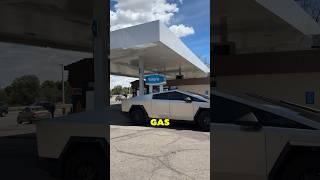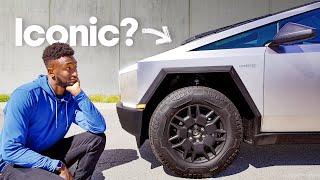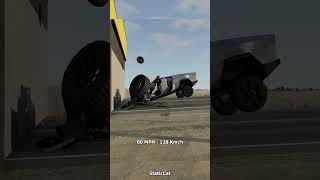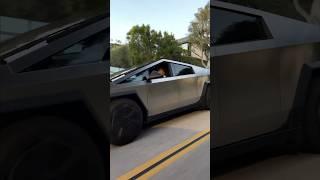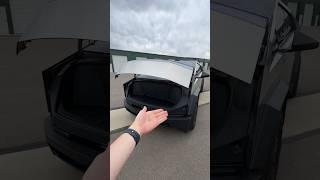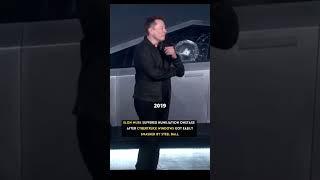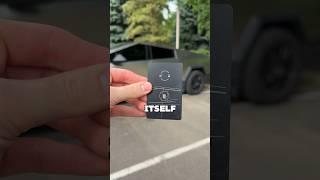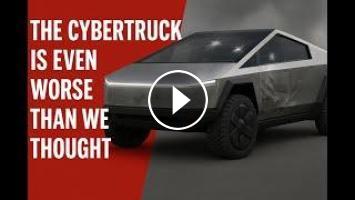After years of promising to revolutionize everything from space travel to social media discourse, he's created his masterpiece: a $100,000 pickup truck that perfectly captures the essence of its creator—shiny on the surface, fundamentally broken underneath, and absolutely convinced of its own genius despite overwhelming evidence to the contrary.
The Tesla Cybertruck isn't just a vehicle; it's Elon's psyche made manifest in stainless steel and delusion. Like its creator, it promises the world, delivers disappointment, and somehow convinces people to pay premium prices for the privilege of being let down. It's the automotive equivalent of Elon himself: loud, angular, desperate for attention, and prone to falling apart under scrutiny.
This is vintage Elon: take a simple concept (pickup truck), wrap it in sci-fi aesthetics and grandiose promises, then completely botch the execution while blaming everyone else for not appreciating his genius. The man who promised to put a million people on Mars by 2024 somehow couldn't figure out how to make truck panels stay attached to a truck.
None
Owners have had over 7 recalls.
Eight recalls in just over a year isn't a quality control problem—it's a psychological profile. This is what happens when a man who's spent his entire adult life being told he's a visionary finally comes face-to-face with the laws of physics and basic engineering principles. Spoiler alert: the laws of physics don't care about your Twitter follower count.
Musk famously does zero market research because, in his infinite wisdom, he believes his personal preferences represent universal truths. The Cybertruck is what you get when someone who's never done an honest day's work in his life decides to design a work truck. It's like commissioning a vegetarian to design a steakhouse—the fundamental disconnect is baked into the DNA.
The most telling thing about the Cybertruck is how perfectly it reflects Musk's own insecurities. Like Elon, it's trying desperately to look tough and futuristic while being fundamentally unsuited for actual work. It's all sharp angles and aggressive posturing, like a middle-aged, divorced dad trying to look intimidating at his kid's soccer game.
The stainless-steel body—which rusts when it rains—is pure Musk: a solution in search of a problem that creates ten new problems while solving exactly none. Traditional automakers use paint because it works, but Elon needed to be different, needed to disrupt, needed to show the world that he knew better than a century of automotive engineering. The result? A truck that develops orange rust spots faster than a 13-year-old boy eating Skittles gets zits.
When Tesla advisors are warning customers that their brand-new trucks will rust if exposed to moisture, you're not buying a vehicle—you're buying a very expensive monument to one man's inability to admit he was wrong. For $6,000 extra, Tesla will wrap your stainless steel truck in paint film, which is like buying a waterproof watch that comes with a warning not to get it wet.
The market has delivered its verdict on Musk's genius, and it's brutal. Sales of fewer than 40,000 units versus his promised 250,000 isn't a miss—it's a massacre. Tesla is sitting on over $200 million in unsold inventory, desperately slashing prices on a product that was supposedly so revolutionary people couldn't wait to buy it.
Those million pre-orders Musk bragged about? They've evaporated like his promises about Twitter becoming a haven for free speech. It turns out that when people saw the actual product—rusting, shedding parts, stranding drivers—they decided their money was better spent on literally anything else.
The Cybertruck's failure isn't just mechanical—it's cultural. Musk has spent the past few years systematically alienating the educated, environmentally conscious consumers who made Tesla successful, all in service of his desperate need to be seen as an edgy free-speech warrior by a bunch of crypto bros and podcast listeners.
The man who once positioned himself as saving the planet from climate change now spends his days retweeting conspiracy theories and cozying up to authoritarians. Buying a Cybertruck isn't just purchasing a defective vehicle; it's subsidizing the ego of a creep.
None
Elon's political transformation has been fascinating to watch—like observing someone gradually reveal that they've always been this petty and insecure, but now they have the platform and resources to inflict their personality disorders on a global scale. The Cybertruck is the perfect vehicle for this new Elon: aggressive, impractical, constantly breaking down, and somehow convinced that its failures are actually features.
The Tesla Cybertruck isn't just a vehicle; it's Elon's psyche made manifest in stainless steel and delusion. Like its creator, it promises the world, delivers disappointment, and somehow convinces people to pay premium prices for the privilege of being let down. It's the automotive equivalent of Elon himself: loud, angular, desperate for attention, and prone to falling apart under scrutiny.
This is vintage Elon: take a simple concept (pickup truck), wrap it in sci-fi aesthetics and grandiose promises, then completely botch the execution while blaming everyone else for not appreciating his genius. The man who promised to put a million people on Mars by 2024 somehow couldn't figure out how to make truck panels stay attached to a truck.
None
Owners have had over 7 recalls.
Eight recalls in just over a year isn't a quality control problem—it's a psychological profile. This is what happens when a man who's spent his entire adult life being told he's a visionary finally comes face-to-face with the laws of physics and basic engineering principles. Spoiler alert: the laws of physics don't care about your Twitter follower count.
Musk famously does zero market research because, in his infinite wisdom, he believes his personal preferences represent universal truths. The Cybertruck is what you get when someone who's never done an honest day's work in his life decides to design a work truck. It's like commissioning a vegetarian to design a steakhouse—the fundamental disconnect is baked into the DNA.
The most telling thing about the Cybertruck is how perfectly it reflects Musk's own insecurities. Like Elon, it's trying desperately to look tough and futuristic while being fundamentally unsuited for actual work. It's all sharp angles and aggressive posturing, like a middle-aged, divorced dad trying to look intimidating at his kid's soccer game.
The stainless-steel body—which rusts when it rains—is pure Musk: a solution in search of a problem that creates ten new problems while solving exactly none. Traditional automakers use paint because it works, but Elon needed to be different, needed to disrupt, needed to show the world that he knew better than a century of automotive engineering. The result? A truck that develops orange rust spots faster than a 13-year-old boy eating Skittles gets zits.
When Tesla advisors are warning customers that their brand-new trucks will rust if exposed to moisture, you're not buying a vehicle—you're buying a very expensive monument to one man's inability to admit he was wrong. For $6,000 extra, Tesla will wrap your stainless steel truck in paint film, which is like buying a waterproof watch that comes with a warning not to get it wet.
The market has delivered its verdict on Musk's genius, and it's brutal. Sales of fewer than 40,000 units versus his promised 250,000 isn't a miss—it's a massacre. Tesla is sitting on over $200 million in unsold inventory, desperately slashing prices on a product that was supposedly so revolutionary people couldn't wait to buy it.
Those million pre-orders Musk bragged about? They've evaporated like his promises about Twitter becoming a haven for free speech. It turns out that when people saw the actual product—rusting, shedding parts, stranding drivers—they decided their money was better spent on literally anything else.
The Cybertruck's failure isn't just mechanical—it's cultural. Musk has spent the past few years systematically alienating the educated, environmentally conscious consumers who made Tesla successful, all in service of his desperate need to be seen as an edgy free-speech warrior by a bunch of crypto bros and podcast listeners.
The man who once positioned himself as saving the planet from climate change now spends his days retweeting conspiracy theories and cozying up to authoritarians. Buying a Cybertruck isn't just purchasing a defective vehicle; it's subsidizing the ego of a creep.
None
Elon's political transformation has been fascinating to watch—like observing someone gradually reveal that they've always been this petty and insecure, but now they have the platform and resources to inflict their personality disorders on a global scale. The Cybertruck is the perfect vehicle for this new Elon: aggressive, impractical, constantly breaking down, and somehow convinced that its failures are actually features.
- Category
- Inventory
Be the first to comment

